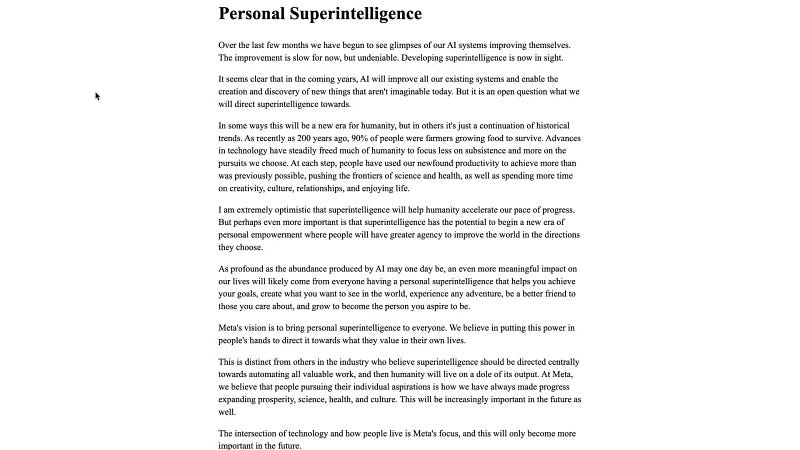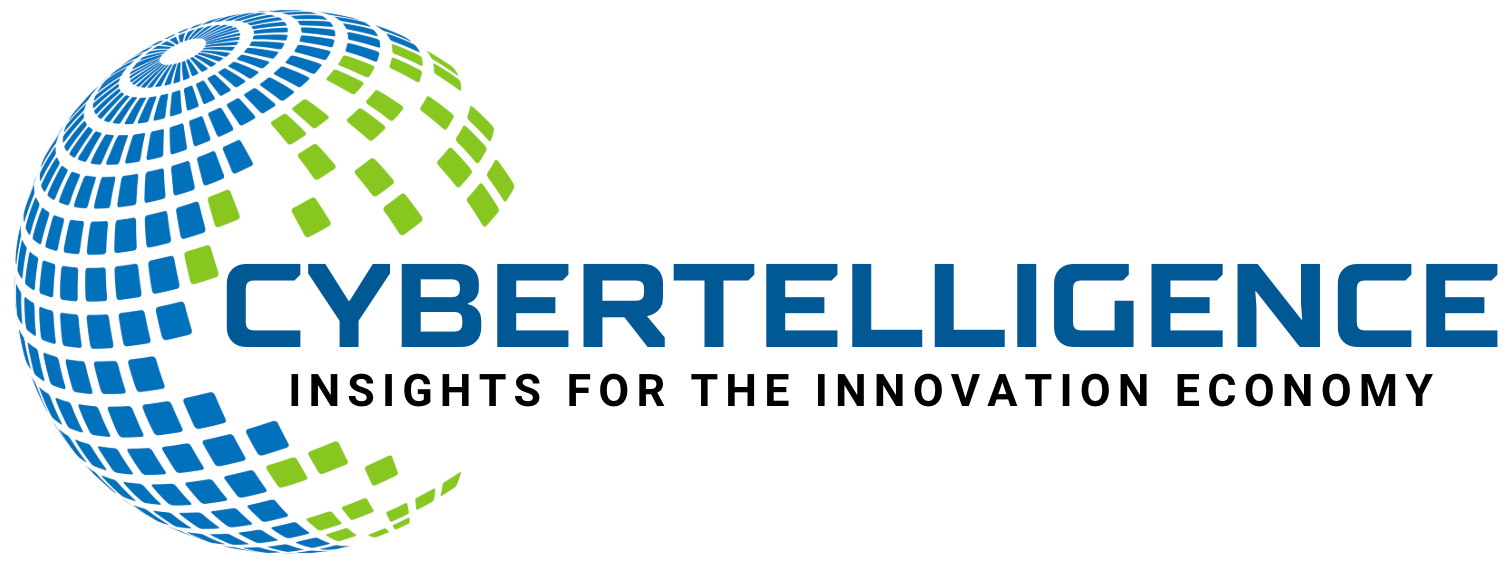Mark Zuckerberg on Meta’s Vision for Self-Improving AI and Personal Superintelligence
In the ever-evolving landscape of AI Trends, a recent essay by Mark Zuckerberg has sparked significant discussion. Zuckerberg outlines…

In the ever-evolving landscape of AI Trends, a recent essay by Mark Zuckerberg has sparked significant discussion. Zuckerberg outlines Meta’s bold vision for “Personal Super Intelligence,” asserting that their AI systems are already showing glimpses of self-improvement. This perspective offers a fresh take on the future of AI, contrasting sharply with competitors who focus primarily on automation and job replacement. As we dive into this vision, we’ll explore the key points, industry reactions, and the broader implications for AI’s role in our lives.
Table of Contents
- Meta’s Bold Vision for the Future of AI
- Industry Reactions: Skepticism and Support
- Vision for AI Beyond Productivity: A Better Life
- Why This Conversation Matters
- Frequently Asked Questions (FAQ)
- Join the Conversation
Meta’s Bold Vision for the Future of AI
Zuckerberg emphasizes that Meta has the resources, expertise, and infrastructure to build and deliver new AI technology to billions of users across its products. This commitment is encapsulated in a vision where AI doesn’t just automate tasks but empowers individuals to do more of what makes them feel fulfilled.
One of the core arguments in Zuckerberg’s essay is that Meta’s AI systems are already displaying early signs of self-improvement. While he carefully phrases this as “glimpses” of self-improving AI, he insists that the progress is undeniable. This perspective suggests that we may have passed a critical “event horizon” in AI development, marking a new phase in AI capabilities.

Industry Reactions: Skepticism and Support
The response to Zuckerberg’s essay has been mixed, reflecting a wide spectrum of opinions within the AI community and beyond.
Petty Critiques and Presentation Comparisons
Some critics focused on superficial aspects, such as the visual style of Zuckerberg’s announcement, comparing it to previous presentations by other AI labs like Save Super Intelligence (SSI). These critiques argue that ideas matter more than presentation, pointing out that such comparisons are petty distractions from the core message.
Mistrust Rooted in Past Meta Initiatives
There is also a deep-seated mistrust of Zuckerberg’s vision, largely due to Meta’s earlier heavy investment in the metaverse, which many now view as a failed or abandoned project. As Luke Thomas noted, the “weird blocky character style” of past metaverse images still lingers in public memory, fueling skepticism about Meta’s current ambitions.
Open Source Commitment: A Changing Stance?
A significant point of debate centers around Zuckerberg’s nuanced stance on open source AI. The essay states:
“We believe the benefits of superintelligence should be shared with the world as broadly as possible. That said, superintelligence will raise novel safety concerns. We’ll need to be rigorous about mitigating these risks and careful about what we choose to open source.”
This has been perceived as a departure from Meta’s previous, more unequivocal commitment to open source AI. Some industry observers worry that Meta may be stepping back from this stance, especially given global competition — notably China’s rapid advancements in AI. Zuckerberg’s ambition to build the best AI models, not just the best open source models, adds further complexity to this issue.
Critiques on the Vision’s Scope and Ambition
Some voices, like transformer editor Shaquille Hashim, criticize the vision as “boring” or lacking imagination. Instead of futuristic concepts like nanobots or brain-computer interfaces, Zuckerberg’s vision leans towards more grounded technologies such as smart glasses. This pragmatic approach has been seen by some as uninspired.
Concerns About Meta’s Business Model
Perhaps the most common and reasonable skepticism revolves around Meta’s advertising-driven business model. Critics argue that as long as Meta’s core remains focused on engagement through dopamine-driven social media platforms, it’s difficult to trust that the company can truly deliver on a vision of personal superintelligence that serves users’ best interests.
As one commentator, Mal, puts it:
“Sounds impressive, and Meta can talk all they want about personal superintelligence. But as long as their core remains an ad-driven dopamine machine, they’re the last company I’d trust with something like this.”
Similarly, Matt Mittelstaedt highlights the tension between Meta’s legacy social media products and the ambitious goals of the new Superintelligence Labs, suggesting that transformative breakthroughs require aiming at bigger problems beyond current product lines.
Vision for AI Beyond Productivity: A Better Life
One of the most intriguing aspects of Zuckerberg’s essay is the clear distinction he draws between two possible futures for AI:
- A future where AI primarily automates work and potentially replaces human jobs.
- A future where AI empowers individuals to do more of what makes them feel fulfilled and live better lives.
Zuckerberg explicitly contrasts Meta’s vision with competitors who focus on automation that displaces jobs. Instead, Meta aims to use superintelligence to enhance personal fulfillment and productivity in ways that align with individual passions and purposes.
This vision challenges us to think beyond the immediate AI transition period that dominates much of today’s discourse. Rather than just focusing on how AI tools will change jobs and productivity in the near future, it asks us to imagine the world after AI transformation — a world where intelligence is abundant, nearly free, and deeply integrated into everyday life.
Why This Conversation Matters
Regardless of how one feels about Zuckerberg or Meta, this essay opens an important conversation about the long-term goals of AI development. Designing AI systems that truly serve people requires a clear vision of what “serving people” means in a world transformed by superintelligence.
We need to move beyond short-term discussions about AI’s impact on jobs and productivity to ask bigger questions about how AI can enhance human experience and well-being. Only with such a vision can we hope to build systems that align with human values and aspirations.
Frequently Asked Questions (FAQ)
What does Mark Zuckerberg mean by “self-improving AI”?
He refers to AI systems that can autonomously enhance their own capabilities over time, showing early signs of learning and improving without direct human intervention.
How does Meta’s vision of AI differ from other companies?
Meta emphasizes personal empowerment and fulfillment, aiming for AI that helps individuals live better lives rather than simply automating jobs or driving universal basic income models.
Is Meta still committed to open source AI?
The essay suggests a more cautious approach to open sourcing AI technologies due to safety concerns, marking a possible shift from earlier, more open commitments.
Why are some people skeptical of Meta’s AI ambitions?
Skepticism arises from Meta’s advertising-driven business model, past metaverse failures, and concerns about whether the company’s financial motivations align with the lofty goals of personal superintelligence.
What is the significance of AI Trends focusing on a vision beyond productivity?
It encourages us to think about how AI can improve overall quality of life and human fulfillment, not just work efficiency, shaping future AI development priorities.
Join the Conversation
As AI continues to evolve rapidly, it’s crucial that we engage in discussions about its future direction. Whether you agree with Zuckerberg’s vision, remain skeptical, or hold a nuanced view, sharing your thoughts helps shape the collective understanding of AI Trends and their impact on society.
We invite you to reflect on what a future empowered by superintelligence should look like and consider how companies like Meta can play a role in building that world.
This article is based on comprehensive research derived in part from the referenced video AI Starting to Self-Improve Says Zuckerberg




